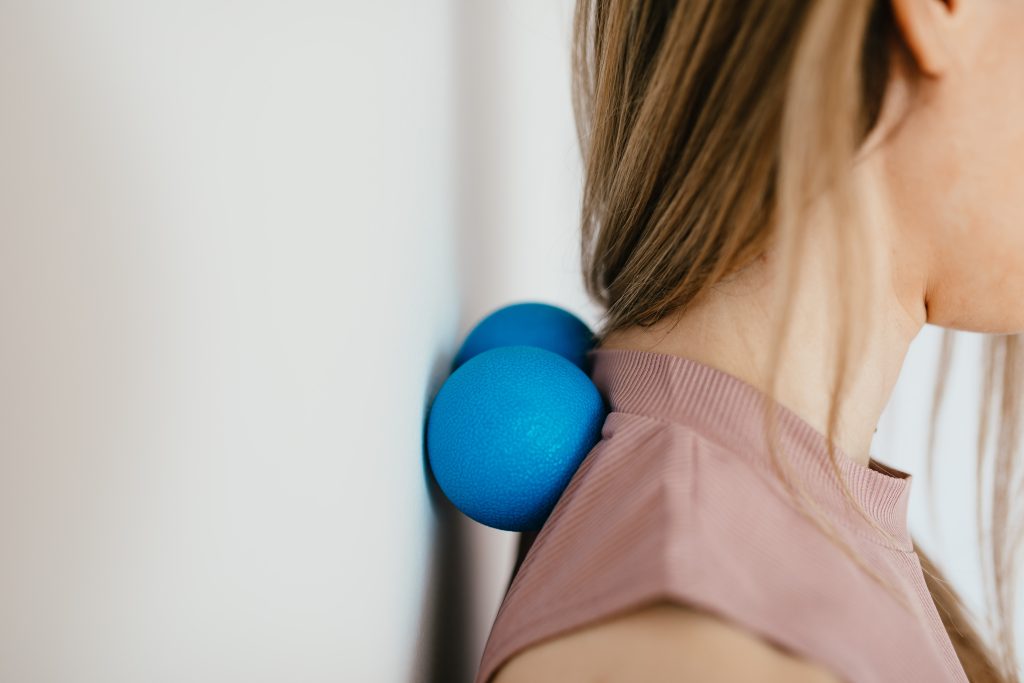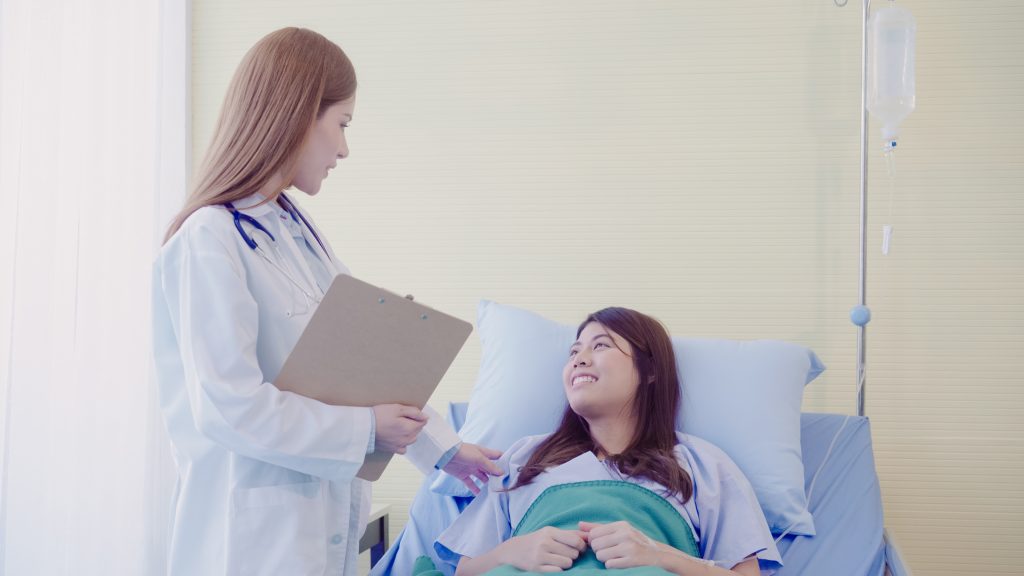Discover the connection between postpartum infections, delivery complications, and back pain.
Can Postpartum Infections or Complications from Delivery Cause Back Pain?

If you’ve recently given birth and are experiencing back pain, you may be wondering if postpartum infections or complications from delivery could be the cause. In this article, we’ll explore the link between these factors and back pain, understand common types of postpartum infections, learn about potential delivery complications, discuss treatment options, and discover ways to prevent postpartum back pain.
Understanding Postpartum Infections
Postpartum infections refer to infections that occur after childbirth. They can affect various parts of the body and can lead to discomfort and pain, including back pain. It’s crucial to understand the different types of postpartum infections and how they can manifest.
After the joyous occasion of giving birth, many new mothers may experience postpartum infections. These infections can occur due to various factors, such as weakened immune systems, hormonal changes, or the introduction of bacteria during delivery. While the body goes through the miraculous process of healing and recovery, it is important to be aware of the potential risks and symptoms of postpartum infections.
Common Types of Postpartum Infections
- Endometritis: This infection affects the lining of the uterus and typically occurs within the first week after delivery. The uterus, which expands during pregnancy to accommodate the growing baby, is left vulnerable to bacteria entering the body after childbirth. Endometritis can cause abdominal pain, fever, and a general feeling of malaise.
- Mastitis: Breastfeeding mothers may develop this infection in their breast tissue, leading to pain and swelling. Mastitis can occur when bacteria enter the breast through cracked or sore nipples. The affected breast may become red, warm to the touch, and tender. It is important for breastfeeding mothers to seek prompt medical attention to prevent complications and ensure the continuation of breastfeeding.
- Urinary Tract Infections (UTIs): Changes in the urinary system after childbirth can increase the risk of UTIs, which can cause discomfort and back pain. Hormonal changes, the use of catheters during labor, or incomplete bladder emptying can contribute to the development of UTIs. Symptoms may include frequent urination, a burning sensation during urination, and lower back pain.
- Wound Infections: If you had an episiotomy or a cesarean section, these surgical wounds may become infected, resulting in localized pain that can radiate to your back. Surgical wounds are susceptible to bacterial contamination, and if proper care is not taken, they can become infected. Signs of wound infections include redness, swelling, warmth, and discharge from the incision site.
These are just a few examples of postpartum infections, but it is important to note that there are other types as well. Each infection requires proper medical attention and treatment to prevent complications and ensure a smooth recovery.
Symptoms and Diagnosis of Postpartum Infections
Recognizing the symptoms of postpartum infections is crucial for timely intervention. Common signs include fever, abdominal pain, foul-smelling discharge, breast tenderness, and painful urination. It is important to remember that these symptoms may vary depending on the type of infection. If you suspect you have an infection, consult your healthcare provider for an accurate diagnosis.
During the diagnosis process, healthcare providers may perform various tests, such as blood tests, urine tests, or wound cultures, to identify the specific type of infection and determine the most appropriate course of treatment. Prompt diagnosis and treatment can help prevent the infection from spreading and minimize discomfort and pain.
In conclusion, postpartum infections are a potential concern for new mothers. Understanding the different types of infections and their symptoms is essential for early detection and proper treatment. If you experience any signs of infection after childbirth, do not hesitate to seek medical attention. Remember, your health and well-being are of utmost importance as you embark on the beautiful journey of motherhood.
Link Between Postpartum Infections and Back Pain
So, how exactly can postpartum infections lead to back pain? Let’s delve into the medical explanation.
Medical Explanation for Postpartum Back Pain
Postpartum infections can cause inflammation and irritation in the affected areas of the body. This inflammation can potentially put pressure on the surrounding nerves, leading to pain, including back pain.
When a woman gives birth, her body goes through various changes and adjustments. The process of childbirth puts immense strain on the body, particularly the pelvic region. This strain can sometimes lead to small tears or injuries in the tissues, creating an entry point for bacteria to enter and cause an infection.
Postpartum infections can occur in different areas of the body, such as the uterus, bladder, or even the surgical incision site if a cesarean section was performed. These infections can be caused by bacteria that are normally present in the body but multiply rapidly due to the weakened immune system and the presence of open wounds.
When an infection develops, the body’s immune response kicks in, leading to inflammation. This inflammation is the body’s way of fighting off the infection and promoting healing. However, in some cases, this inflammation can extend beyond the immediate site of infection and affect nearby structures, such as the nerves in the back.
The nerves in the back are highly sensitive and can become irritated when exposed to inflammation. This irritation can manifest as pain, which is commonly experienced as back pain in individuals with postpartum infections.
Duration and Severity of Postpartum Back Pain
The duration and severity of postpartum back pain can vary from person to person. For some, it may be short-lived and mild, while for others, it can persist for weeks or months. The intensity of the pain can also vary, ranging from a dull ache to sharp, shooting pains.
Several factors can influence the duration and severity of postpartum back pain. The type and location of the infection play a role, as some infections may cause more inflammation and nerve irritation than others. Additionally, individual factors such as overall health, immune system function, and pain tolerance can also impact how the body responds to the infection and subsequent pain.
If you’re experiencing severe or prolonged back pain after childbirth, it’s essential to consult with your healthcare provider for proper evaluation and management. They can assess the underlying cause of the pain, determine if it is related to a postpartum infection, and recommend appropriate treatment options.
Treatment for postpartum back pain may involve a combination of antibiotics to treat the infection, pain medication to alleviate discomfort, and physical therapy exercises to strengthen the back muscles and improve posture. In some cases, additional interventions such as heat therapy or chiropractic adjustments may also be beneficial.
Remember, every woman’s postpartum experience is unique, and it’s crucial to seek professional medical advice to ensure the best possible care and management of any postpartum complications or discomfort.
Complications from Delivery and Back Pain
In addition to postpartum infections, certain delivery complications can contribute to back pain. Let’s explore these potential complications and how they relate to back pain.
Potential Delivery Complications
Delivery complications can include issues such as prolonged labor, instrumental delivery (forceps or vacuum extraction), or the need for emergency cesarean section. These factors can put additional strain on your back and potentially cause discomfort or pain.
Prolonged labor, also known as a prolonged active phase, occurs when the cervix takes longer than usual to dilate. This can be caused by various factors such as a large baby, an unfavorable position of the baby, or inefficient contractions. As the labor progresses, the prolonged strain on the back muscles can lead to pain and discomfort.
Instrumental delivery, which involves the use of forceps or vacuum extraction, is sometimes necessary to assist with the delivery process. While these tools can be helpful in certain situations, they can also increase the risk of back pain. The force exerted by forceps or vacuum extraction can strain the muscles and tissues in the lower back, leading to postpartum discomfort.
In emergency situations, a cesarean section may be required to ensure the safety of both the mother and the baby. This surgical procedure involves making an incision in the abdomen and uterus to deliver the baby. The recovery process after a cesarean section can be challenging, and back pain is a common complaint during this time. The abdominal muscles, which play a crucial role in supporting the back, are weakened after the surgery, putting additional stress on the back muscles.
How Delivery Complications Can Lead to Back Pain
During delivery, your body undergoes significant physical stresses. Complications can exacerbate these stresses and lead to muscle strains, tissue damage, or even spinal misalignments, which may result in back pain.
When labor is prolonged, the continuous contractions and pressure on the back can cause muscle strains. The muscles that support the spine may become fatigued and overworked, leading to discomfort or pain. Additionally, the prolonged pressure on the spinal discs can result in herniation or bulging, further contributing to back pain.
Instrumental delivery techniques, such as forceps or vacuum extraction, involve applying force to assist in the delivery process. This force can sometimes cause trauma to the soft tissues in the lower back, leading to inflammation and pain. The sudden and forceful movements during instrumental delivery can also strain the muscles and ligaments in the back, causing discomfort.
In the case of emergency cesarean section, the surgical incision and subsequent healing process can contribute to back pain. The incision site may cause discomfort, and the altered posture during recovery can put additional strain on the back muscles. The body’s natural compensatory mechanisms to protect the incision site can lead to imbalances in muscle strength and coordination, resulting in back pain.
It is important to note that not all women who experience delivery complications will develop back pain. Factors such as individual anatomy, overall health, and postpartum care can influence the likelihood of experiencing back pain. However, being aware of these potential complications and their relationship to back pain can help women understand the possible causes and seek appropriate care if needed.
Treatment Options for Postpartum Back Pain
Addressing postpartum back pain involves various treatment options, ranging from medical interventions to home remedies and lifestyle changes.
Medical Treatments and Therapies
Your healthcare provider may recommend pain medications, physical therapy, or chiropractic adjustments to alleviate your back pain. Additionally, they might explore alternative therapies, such as acupuncture or osteopathic manipulative treatment, to support your recovery.
Home Remedies and Lifestyle Changes
There are also simple steps you can take at home to manage postpartum back pain. These include applying heat or cold packs to the affected area, practicing gentle stretching exercises, using supportive cushions or pillows, and maintaining good posture. Additionally, engaging in regular physical activity, getting enough rest, and seeking support from your partner or loved ones can contribute to your overall well-being.
Preventing Postpartum Back Pain
Of course, prevention is always better than cure. Taking precautions during pregnancy and practicing post-delivery care can help minimize the risk of postpartum back pain.

Precautions During Pregnancy
During pregnancy, it’s important to practice proper body mechanics when lifting or carrying heavy objects, avoid prolonged standing or sitting, wear comfortable and supportive footwear, and listen to your body’s cues. Additionally, maintaining a healthy weight, staying active, and practicing prenatal exercises can help strengthen your back muscles.
Post-Delivery Care and Practices
After delivery, prioritize self-care, including gentle exercises to aid in postpartum recovery. Gradually increase your activity levels, listen to your body’s limitations, and avoid overexertion. Take advantage of the available support systems, such as lactation consultants or postpartum support groups, to ensure a smooth transition into motherhood.
By understanding the link between postpartum infections, delivery complications, and back pain, you can take proactive steps to address and prevent discomfort. Remember, every mother’s experience is unique, so consult with your healthcare provider to create a personalized plan that aligns with your specific needs. Embrace the joy of motherhood, while also prioritizing your health and well-being!



